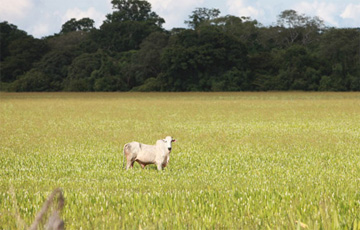BNDES, Brazil’s national development bank, contributed to Amazon deforestation by lending billions of dollars to commercial meatpackers, driving expansion of cattle ranching across the world’s largest rainforest, ruled an audit by the Federal Audit Court.
The ruling, reported by the O Estado de São Paulo, concluded that some of the meatpackers that benefited from nearly $10 billion in loans between 2008 and 2010 were supplied by ranches involved in slave labor and illegal deforestation. BNDES, which lent 137 billion reais ($69 billion) in 2009 alone—more than the World Bank, apparently disregarded internal safeguards in its rush to extend Brazil’s position as the world’s largest beef exporter.
The Federal Audit Court’s findings are consistent with those presented in reports published in 2009 by Amigos da Terra – Amazônia Brasileira and Greenpeace.
 Mato Grosso. Photo by Rhett A. Butler |
“The audit states that the [President Lula] proved responsible for failed coordination and guidance in this respect and that, as a consequence of this, public funds were invested into illegal deforestation and slave labor,” Roberto Smeraldi of Amigos da Terra – Amazônia Brasileira told mongabay.com. “The audit expressly highlights how mere compliance with legislation by the bank does not help in avoiding deforestation, unless standards are implemented towards changing the pattern of production.”
Smeraldi says the audit shows the need for BNDES to focus financing on a transition towards a more productive and sustainable type of ranching, rather than unregulated expansion of the industry. Embrapa, Brazil’s agricultural research agency, has shown that beef production in Brazil can be expanded substantially without deforestation through better pasture management, improve genetic stock, and other intensification techniques.
Pressure for reform in the sector is now being driven by major beef buyers — including Walmart Brasil and Pão de Açúcar — and public prosecutors, including Daniel Avelino, the prosecutor for the state of Pará.
Related articles
Concerns over deforestation may drive new approach to cattle ranching in the Amazon

(09/08/2009) While you’re browsing the mall for running shoes, the Amazon rainforest is probably the farthest thing from your mind. Perhaps it shouldn’t be. The globalization of commodity supply chains has created links between consumer products and distant ecosystems like the Amazon. Shoes sold in downtown Manhattan may have been assembled in Vietnam using leather supplied from a Brazilian processor that subcontracted to a rancher in the Amazon. But while demand for these products is currently driving environmental degradation, this connection may also hold the key to slowing the destruction of Earth’s largest rainforest.
Activists target Brazil’s largest driver of deforestation: cattle ranching

(09/08/2009) Perhaps unexpectedly for a group with roots in confrontational activism, Amigos da Terra – Amazônia Brasileira is calling for a rather pragmatic approach to address to cattle ranching, the largest driver of deforestation in the Brazilian Amazon. The solution, says Roberto Smeraldi, founder and director of Amigos da Terra, involves improving the productivity of cattle ranching, thereby allowing forest to recover without sacrificing jobs or income; establishing a moratorium on new clearing; and recognizing the economic values of maintaining the ecological functions of Earth’s largest rainforest.
Brazil’s development bank to require beef-tracking system to avoid illegal Amazon deforestation
(07/01/2009) Responding to allegations that major Brazilian cattle producers are responsible for illegal forest clearing in the Amazon, Brazil’s development bank BNDES will soon require processors to trace the origin of beef back to the ranch where it was produced in order to qualify for loans, reports Brazil’s Agencia Estado. The traceability program aims to ensure that cattle products do not come from illegally deforested land.
Nike, Unilever, Burger King, IKEA may unwittingly contribute to Amazon destruction, says Greenpeace

(06/01/2009) Major international companies are unwittingly driving the deforestation of the Amazon rainforest through their purchases of leather, beef and other products supplied from the Brazil cattle industry, alleges a new report from Greenpeace. The report, Slaughtering the Amazon, is based on a three-year undercover investigation of the Brazilian cattle industry, which accounts for 80 percent of Amazon deforestation and roughly 14 percent of the world’s annual forest loss. Greenpeace found that Brazilian beef companies are important suppliers of raw materials used by leading global brands, including Adidas/Reebok, Nike, Carrefour, Eurostar, Unilever, Johnson & Johnson, Toyota, Honda, Gucci, Louis Vuitton, Prada, IKEA, Kraft, Tesco and Wal-Mart, among others.
Beef consumption fuels rainforest destruction

(02/16/2009) Nearly 80 percent of deforestation in the Brazilian Amazon results from cattle ranching, according to a new report by Greenpeace. The finding confirms what Amazon researchers have long known – that Brazil’s rise to become the world’s largest exporter of beef has come at the expense of Earth’s biggest rainforest. More than 38,600 square miles has been cleared for pasture since 1996, bringing the total area occupied by cattle ranches in the Brazilian Amazon to 214,000 square miles, an area larger than France. The legal Amazon, an region consisting of rainforests and a biologically-rich grassland known as cerrado, is now home to more than 80 million head of cattle. For comparison, the entire U.S. herd was 96 million in 2008.
Beef drives 80% of Amazon deforestation

(01/29/2009) Nearly 80 percent of land deforested in the Amazon from 1996-2006 is now used for cattle pasture, according to new maps released today in a report by Greenpeace at the World Social Forum in Belem, Brazil. The report, Amazon Cattle Footprint: Mato Grosso: State of Destruction, confirms that cattle ranching is the primary driver of deforestation in Earth’s largest rainforest: the Brazilian Amazon.